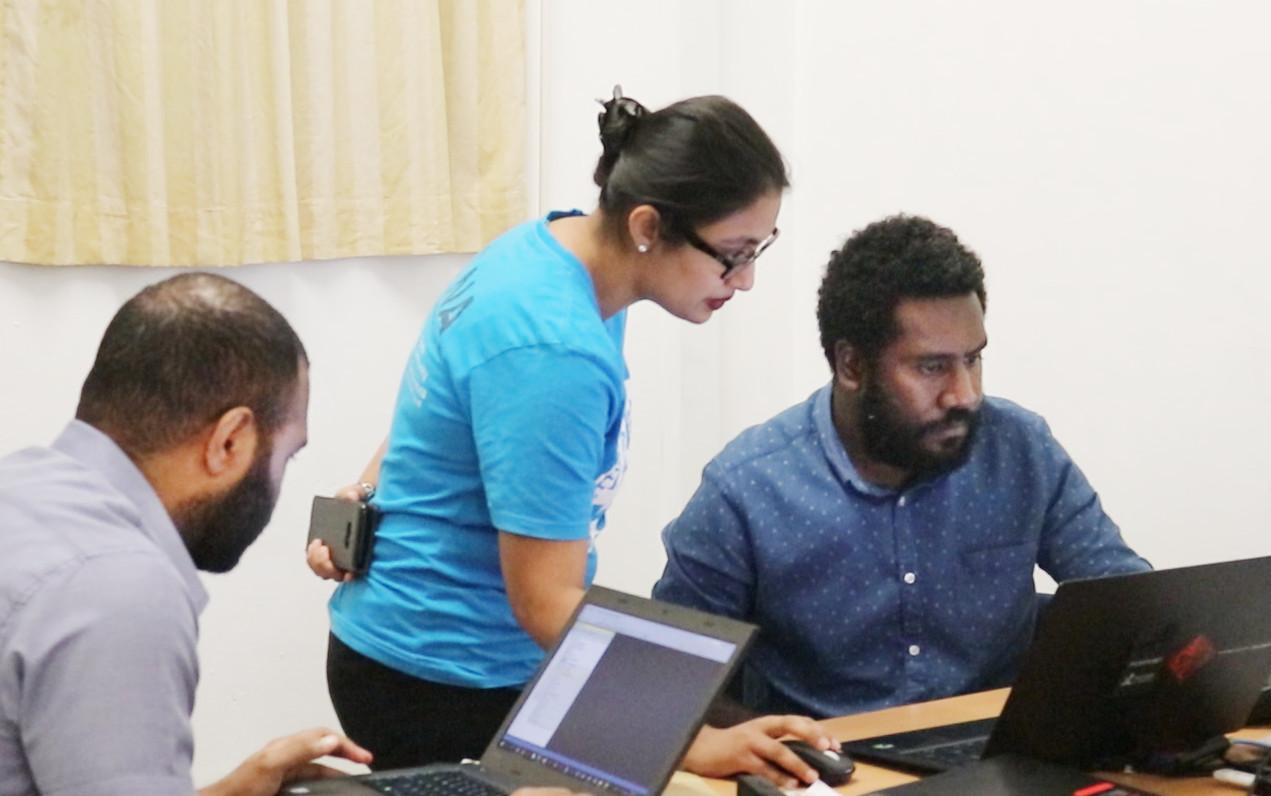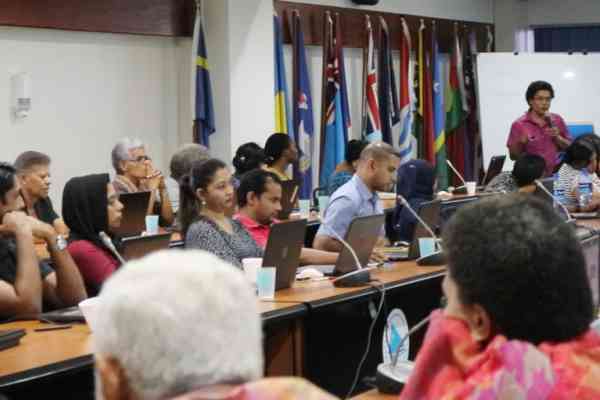EQAP’s Rukshar Khan, standing, guides Vanuatu Education Ministry’s IT manager Adrian Banga on the PacSIMS components, as her colleague Senitiki Rokocakau works nearby.
All of Vanuatu’s Year 11 students, irrespective of whether they are enrolled in an English-speaking or French-speaking school, will experience the same curriculum.
This follows more than eight years of perseverance by Vanuatu’s Ministry of Education to harmonise the two school systems.
The two systems, which differed in many ways – from the language of instruction to the curriculum’s design and content – have been an immense challenge for the island nation since its independence.
There are 71 Anglophone (English-speaking) and 33 Francophone (French-speaking) schools in Vanuatu.
The ministry, which embarked on curriculum reforms to make learning more competency-based for students, wants the revised curriculum to be used by all schools. The Pacific Community’s Educational Quality and Assessment Programme (EQAP) has been working closely with the ministry on the reforms.
Vanuatu’s Director of Education Services Samuel Katipa says the reform work with the Year 11 and Year 12 curriculum was on track and they were very thankful for the assistance received from EQAP.
“The work with Year 11 and Year 12 curriculum has set the pathway toward the Vanuatu National Secondary School Certificate (VNSSC),” he explains. “This is very good for us because, not only is there just one system, the new curriculum is more contextualised to Vanuatu.”
He also acknowledged the assistance of EQAP’s development partners, the Australian Government Department of Foreign Affairs and Trade (DFAT) and the New Zealand Government Ministry of Foreign Affairs and Trade (MFAT). Both the New Zealand and Australian governments are important partners of the Pacific Community in its efforts to strengthen human capacity and reduce poverty for the sustainable development of the region.
Mr Katipa adds that he is enthusiastic about the continued collaboration with the Pacific Community, particularly after learning about EQAP’s various initiatives. He made the comments after the Pacific Board of Educational Quality meeting in Nadi last month.
EQAP team leader (Curriculum and Assessments) Mere Vadei says the harmonisation of Vanuatu’s two systems is a major undertaking, and “its success will be a true hallmark of the vision and commitment” of the country’s education ministry.
The reformed curriculum adopts the same student-focused approach applied by the regional Year 13 curriculum, which is the South Pacific Form Seven Certificate (SPFSC), set and examined by EQAP. This approach is more competency-based and encourages students to be independent learners.
The ministry’s information management system, called the Open Vanuatu Education Management Information System (Open VEMIS), is also being upgraded to support the alignment between the curriculum’s syllabus, assessments, reporting and intervention.
The system will integrate EQAP’s information management system (PacSIMS) in order to support the collation and verification of internal assessments and examination results.
“This integration will harmonise the various components of the reform in ways not done ever before in Vanuatu,” says Mrs Vadei. “This is a reflection of new developments in EMIS and shared understanding of the necessity of such a system to enable easy access to relevant and useful data/information.”
The ministry’s IT manager Adrian Banga says the integration is a good initiative.
“(This should) make assessment data accurate and hopefully improves the processing of examination results to be available to parents, education and public at large at a timely manner,” he says.
EQAP’s PacSIMS is an advanced cloud-based system that has managed the data for SPFSC since 2017. The data includes student and teacher details, as well as internal assessment and examination results. Last year the results of the regional qualification were processed within minutes of data entry completion, with a resultant error margin that was negligible.
The integration work will be trialled first with Vanuatu’s Year 11 assessments and examination this year, in preparation for the full run of the Year 12 national qualification next year.
Mr Banga says EQAP’s visit in February allowed for them to work through the technical specifications of the integration.
“We are now more aware on the functions available on PacSIMS and that will benefit us in our plans on how to add an assessment module in our Open VEMIS that will be integrated with PacSIMS,” he explains.
EQAP’s team leader (ICT) Melvin Ramkhelawan says the mission, which started last year, has progressed fairly well with the first phase of training the relevant ministry officials completed.
“The next phase will be to input the data into the system,” he says.
Vanuatu had sought EQAP’s assistance when the idea of developing PacSIMS was discussed at the annual meeting of EQAP’s governing board (PBEQ) in 2017. The board is a sub-committee of the Committee of the Representatives of Governments and Administrations (CRGA), which is the Pacific Community’s governing body. PacSIMS is a service EQAP offers free-of-charge to member countries and territories to support their delivery of quality education.

